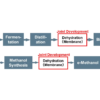New research findings show that air pollution in northern India is not only harmful to human health, but also has a serious impact on the country's efforts to achieve clean air goals. A study conducted by researchers at the Indian Institute of Technology (IIT) Jodhpur found that fine particulate matter (PM2.5) is the most harmful component of air pollution, whose oxidative capacity is much higher than other particles. ,
This study shows that reducing PM mass alone will not be effective in reducing health impacts, and it is also important to address local sources of PM pollution, such as biomass and fossil fuel burning, including traffic exhaust. The study also found that the chemical composition of PM varies significantly between rural and urban areas, with ammonium chloride, and organic aerosols arising directly from traffic exhaust, residential heating, and oxidation products of fossil fuel emissions produced in the atmosphere contributing to PM pollution. But dominate.
In contrast, outside Delhi, ammonium sulfate and ammonium nitrate, as well as secondary organic aerosols from biomass burning vapors, are major contributors. The study highlights that addressing India's air pollution crisis requires collaboration between local communities and stakeholders as well as social change, especially in densely populated urban areas like Delhi. This study provides valuable insights for evidence-based policies and interventions aimed at protecting public health and the environment for future generations.
The research findings suggest that prioritizing mitigation strategies based on the most significant health impacts, particularly targeting local inefficient combustion processes, is needed in northern India.


